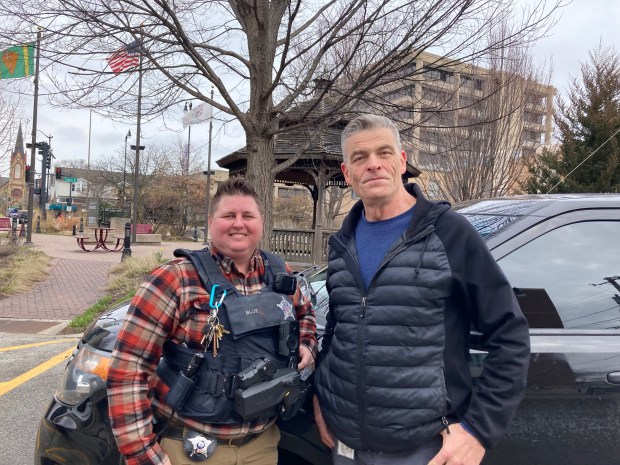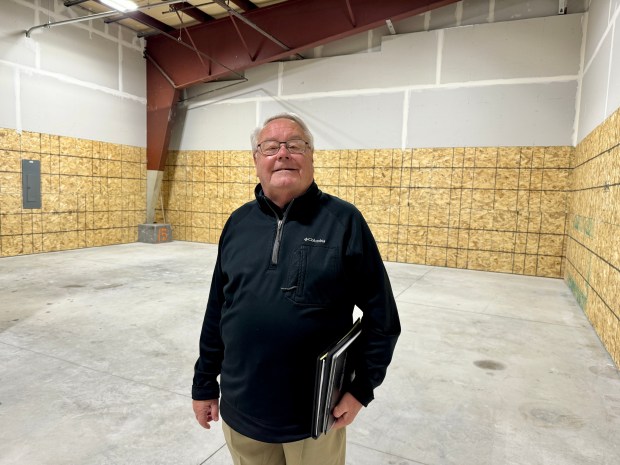If police in Skokie get a call for someone who’s declaring they’re going to commit suicide, yelling at their spouse in a threatening manner or screaming on the street, a co-responder team is prepared to respond.
The co-responders, Brian McHugh, a social worker with the village, and Kimberly Blue, a Skokie police officer, are both trained in crisis intervention, and they work together to defuse mental health situations before they can devolve into violence or trauma.
Around the nation, on an unnervingly regular basis, police shoot and kill people who are acting out in mental health crises. In recent years, many police departments have started co-responder models or response teams made up solely of mental health professionals to respond to mental health calls.
“What we know is that people in crisis usually aren’t violent. Often, a law enforcement response escalates the situation,” said Hannah Wesolowski, chief advocacy officer of the National Alliance for the Mentally Ill.
As a national awareness of these issues began to grow, Skokie formed the co-responder team in 2021.
“We respond to cases involving mental health, domestic violence and suicide — any situation that could potentially put someone into a crisis,” said McHugh, adding that either 911 dispatchers or police on scene might summon them.
“We’re trying to get people to understand from the start that we’re here to help,” Blue said. ‘The first words out of my mouth when we find a person in crisis is that we’re not here to arrest you. My main objective is to get you where you need to be, whether that’s a hospital or a safe space.”
“What we’re able to do is spend time with people,” McHugh said. “If we need to spend two hours or longer talking to someone, we can do that. Most of the time, people just need us to listen. You can often defuse a situation if you remain calm and let people tell you what they need. And then we can help them with those needs through social services.”
Patrol officers always face time pressure to move on and respond to the next call, said Skokie Police Chief Jesse Barnes, which is why the co-responder team “has been huge for us.”
“Patrol officers love that (Blue and McHugh) can respond,” he explained. “This program has been embraced and received buy-in from all the stakeholders. It’s been a fantastic program.”
McHugh doesn’t wear a police uniform, and his presence can often help de-escalate a potentially dangerous situation. However, he is aware that violence is always a possibility in some of these cases, which is why he relies on his partner for guidance.
“She is in charge of safety, so I’ll always defer to her when it comes to that,” he said. “I have a bulletproof vest, which I usually don’t wear. But Officer Blue will tell me to put it on, and I’ll listen. This is a police matter, and she’s in control of the situation.”
“Brian has been able to adapt his knowledge of what safety looks like from a police officer standpoint,” Blue said. “I trust Brian and his decisions. I don’t have to hover over him to ensure he’s safe. He knows, OK, this could potentially be bad, so I’m going to take steps back.
“We always know time and space is our friend, and when we come across people in those critical moments, you can see the body shifting on whether or not they’re being receptive. It goes as far as asking a simple question: ‘Hey, am I too close to you? Do you need me to take a few steps back? Is it OK if I sit here? Will this make you uncomfortable?’
“Small things like that de-escalate any situation. Even offering someone a bottle of water goes a long way,” she said.
Blue’s experience with McHugh has helped her to better serve people during difficult situations like a suicide or violent incident.
“I am a police officer, and we have to treat the area as a crime scene,” she said. “But to the people involved, it’s a tragedy. I can gently talk to the family about the situation, walk them through everything that’s going on, and do my best to explain it to them. I know what information the police need, and I can hopefully get it without being too intrusive and respecting what they’re going through.”
In addition to emergency calls, McHugh and Blue also help people treat ongoing problems and navigate the social services available to them.
“If officers go out and there’s an elderly couple or an elderly person who doesn’t have any food in the house, we’ll go out to the food pantry and pick up food for them,” McHugh said. “We can help them find services available through Skokie or the state.
“Skokie is pretty rich when it comes to those resources. We have a great food pantry. We’ve got a great library. There are mental health and domestic violence agencies within our area that we have close relationships with. We aren’t just here at the point of crisis; we want to continue to solve the problem.”
Building relationships also can do wonders down the line in supporting people fighting mental illness.
“If you take the time to really listen to what the person is saying, they feel like they’re being heard, and they remember that,” McHugh said. “They remember that when Officer Blue and I come back for follow-ups. It’s like, hey, these two people… listened to me, and I felt secure and validated by them.
“I’ve shown up on calls because I’ve already had that relationship,” he said. “For example, there was an individual who tried to jump out of a window, and he had barricaded himself into this room. As soon as he learned that I was on the scene, he automatically calmed down and unlocked the door. I was able to sit and have a conversation with the individual.”
While their partnership began toward the end of the pandemic, when mental health issues were gaining new attention, both McHugh and Blue said that struggles with mental health aren’t new — and aren’t going away.
“I think mental health issues have always been at pandemic levels,” Blue said.
“It’s a very difficult thing to solve,” McHugh said. “Once people get treatment, they get stable and feel better. Once they start to feel better, they stop taking their medications. They think ‘I’m better now’ — and then the cycle slowly starts to creep up again.
In many cases, family members have called police for help calming the person, but when police arrived, the violence only escalated, as it did when Elk Grove Village police killed a 24-year-old man in mental health crisis last December after someone called for help.
Wesolowski, of NAMI, said that Denver was one of the first places to launch a mental health response, called the STAR program, and that Stanford University research found it to be highly cost effective, with a reduction in jailing people and no increase in violent acts.
It’s a growing trend for law enforcement to mount a mental health response, she said.
Locally, the Aurora Police Department has also launched a mental health crisis response team. The Waukegan Police Department recently launched a co-responder team.
In 2021, under Mayor Lori Lightfoot, the Chicago Police Department launched its Crisis Assistance Response and Engagement (CARE) program, which integrates mental health professionals and paramedics into the 911 response system. The pilot program, which started with two Chicago neighborhoods, has now expanded into 11 areas of the city.
McHugh finds the growing number of mental health response programs to be a positive trend.
“I’ve seen nothing but benefits of this arrangement,” he said.
“One of the things that’s very rewarding is helping people get through (their) process,” he said. “We’ll leave somewhere, and I’ll get a text from someone we worked with who says they’re praying for us. That’s really an honor — to know that you made a difference in somebody’s life.”




